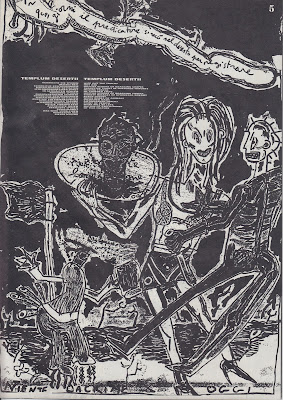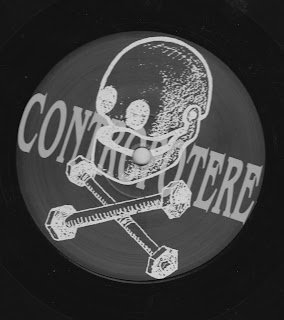Lately, I have been thinking about the first half of the 00's quite a lot. To be precise, I focused on its connections and articulations with the second part of the 90's. I can understand that it does not sound like a particularly glamorous subject but my current state of unemployment allows me to actually think harder than usual about those things (Wait...who just yelled "no life!" at me?). As you would expect, HHIG and Tragedy came up. They are not really favourites of mine but I definitely played them an awful lot in the early 00's (but then everybody kind of did I think) and I have always felt they were good bands even when I couldn't relate to some of their materials. Thinking about the transition from a 90's band to a 00's one was interesting, although it always gets tricky with the benefit of hindsight and one is quick to jump at conclusions that could be irrelevant. And then it struck me, there were two other bands that I love dearly that embody the 90's-00's transition even better than HHIG and Tragedy: the formidable Jobbykrust and The Dagda.
In fact, I suppose that you could even argue that the sole Jobbykrust are one of the most accurate depiction of the evolution of punk in the 90's and that The Dagda probably released one of the very best (and I mark my word) "crusty-dark-post-hardcore-whatever" Lp of their decade (their second Lp being my favourite album of black-metal-infused crust). Yet, The Dagda's greatness did not come out of nowhere and the last two JK recordings - the split Lp with Blofeld and "The Descent of Man" - paved the way for "Threefold" not only because three members of the last JK's line-up would form The Dagda but also because an Lp like "The Descent of Man" indicated the path that was to be followed after the demise of JK, not only for these Belfast punks but for large segments of the DIY punk/hardcore scene as well. Listening to 1997's "The Descent of Man" and 2002's "Threefold" back to back is a great experience as it illustrates perfectly the best aspects of both eras and what was genuinely good about them and I would tend to think that the same can be said about HHIG and Tragedy, but it is a task better left to someone who appreciates these bands more than the underpaid staff at Terminal Sound Nuisance.
As I mentioned, Jobbykrust's existence is an accurate representation of the 90's as a whole. They formed in 1990 in a Belfast estate and after learning how to play (it almost took two years apparently) they recorded two demos, "Naivety or hope" and "Starve the starving", in 1992. Both recordings are snotty, raw and fast punk ragers that are strongly rooted in the mid/late 80's Belfast anarchopunk sound, reminiscent of DIRT, Toxic Waste or even Pink Turds In Space. This obvious 80's influence also transpired in the direct and angry lyrics about The Troubles and how it affected every aspect of Belfast social life. On a musical level, Jobbykrust's debuts were not unlike Disaffect's as both bands built on the fast and angry 80's punk sound with the inherited trade-off male/female vocals but added, unconsciously, an early 90's punk feel to it. I really like JK's demos but the real shift came when Glyn joined as the second singer and second guitar in 1994. Not only was he an intense singer but his articulate guitar playing and his sense of multilayered songwriting slowly turned JK into a complex, metallic, almost progressive anarchopunk band.
The change could be spotted on the 1994 split Ep with Blurred Vision, although Glyn didn't play the guitar on this one, as JK's sound was growing more metallic and crunchier, not unlike Fleas And Lice perhaps. But the real breakthrough came with their 1996 split Lp with Viktors Hofnarren that demonstrated a much more refined, layered, moodier, but still as angry, metallic punk side to JK that combined the old-school intensity of Anti-System with the groovy metal crunch of Dystopia and a post-hardcore progressive, slightly dissonant vibe emphasized through the solid dual guitar work. Their side of the album showed a developing intent to shape a sonic atmosphere and to rely on textures as much as on hard-hitting thrashy punk to convey meaning, when their local touring partners, Bleeding Rectum, only (albeit very effectively) relied on the latter or Disaffect perfected the 90's anarchopunk formula with added thrash but without significant breaks in the classic punk structures. Perfectly produced by Marty (from Toxic Waste/Bleeding Rectum/Pink Turds) for the genre, JK's recording, with its intense and modern blend of influences, reflected a departure from the traditional hard-hitting anarcho sound but at the same time, in a proper syncretic move, confirmed its validity through the very addition of new elements, not unlike what Hiatus did on their last records. This is possibly the most cohesive work of Jobbykrust and its appeal should have been huge.
JK's split with Viktors Hofnarren is objectively a better record than "The Descent of Man" or the split Lp with Blofeld (both of which were recorded at the same time), but it is, arguably, probably not as interesting and certainly not as relevant in my modestly analytical quest of crusty/anarcho bands going progressive. In Armed With Anger, it is revealed that the writing of the songs that would appear on JK's last records was not only time-consuming but also mind-consuming for Glyn, Trues and Tim. It is no coincidence that the three of them formed The Dagda after the official demise of Jobbykrust because, on some level, "The Descent of Man" can be seen as the premise to The Dagda's monumental music. Although, the production of the Lp is not totally adequate for what they were trying to achieve (it lacks thickness and power), the songwriting is still incredible and even ahead of its time as I can hear a lot of elements that would appear in a shape or another in the "neocrust" wave that would ignite five years later. The songs are long, multilayered and have a powerful and intricate narrative quality. The band was trying to tell their stories differently, or perhaps they were retelling the same stories but in a different form, with different feelings being at stake. The cope of "The Descent of Man" is impressive in spite of its flaws. It is an intense album with an anger and a passion that feel hardly contained, almost out of control, which I think is both its quality, as it roots the Lp in the "angry anarchopunk" camp, and its limit, as you can tell that the intended intensity gets a bit lost through a lack of focus.
This said, I absolutely love this album. There is a sincerity, a tension, a density that cannot be faked. There is a variety of paces on "The Descent of Man", from the crushing and slow, to the fast and pummeling, to the eerie and dirgy, to the heavy and mid-paced, so that it never feels redundant or predictable. The guitar parts are excellent, complementary and the layers have been well thought-out, there is a real diversity in terms of moods and textures, although the production does not make them shine enough. The bass lines are intricate and really upfront and the dual vocals are extremely intense, harsh even, almost on the verge of dementia, and confer a sense of angry desperation to the Lp that is reinforced through their polyphonic arrangement. "The Descent of Man" is imperfect, it is a bit too raw and it would have needed more time I presume. It is, however, one of the most intense and intense and original anarchopunk records of its time. It invokes a whirlwind of different emotions like anger, awe, outrage, melancholy, sadness, hopefulness or suffering in a very direct, unfiltered way, which makes it a very punk album despite the progressive songwriting. There is beauty in it. I cannot help but notice a black-metal influence running through it, probably because of the thin sound and the vocals, but there is also a Neurosis vibe at times (if a tad sloppy). The faster parts remind me of late-Sedition for the insane ferociousness and the crusty and the crunchy metal parts point to late-Nausea or Extinction of Mankind, but on the whole Jobbykrust really had their own sound at this point and if anything they were much more inventive than derivative.
The lyrics are one of the strongest points of the band, which was a common trait among the Belfast scene. They are meaningful: angry and yet uplifting. The song "Fear" is so relevant even now and could be applied to the current state of emergency that is being implemented in France in 2016, while "An end to transgressions" still makes sense in the context of austerity politics hitting the lower-classes.
Fear
"Find the rejects, social outcasts
Find the scum, you find your prey
Light the fuse of social hatred
Plant the seeds of disarray
Moral terror, indignation
Abuse the devils that we fear
Public outcry fuels the bonfire
Outlaw these people to stop the fear
Label them all, demean the few
Isolate, segregate, stigmatise them all
There for your goals, abused for your aims
Manipulate, exaggerate, there for the blame
There for the blame, there for the fall
Used as scapegoats to outrage us all
Standards are set, values are made
Panic's created to allow for change
Our horror fuels reaction
Our panic fuels the response
Reap the fear"
An end to transgressions
"We shall not submit to the laws they have created
An illusion of liberality that bureaucracy maintains
For every inch that they give we'll take a step back
and examine their concessions in light of the facts
They'll only give if they can take more back
A compromise from a position of strength
Actions designed do serve their own interests
Not those of the masses they're supposed to reflect"
This is clever and genuine punk-rock.



















































